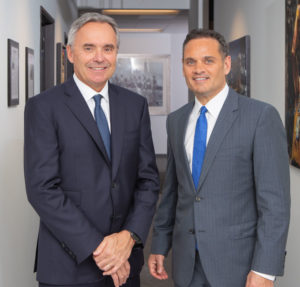Handling Insurance Company Biases Against Motorcyclists
Handling Insurance Company Biases Against Motorcyclists
Motorcycle riders often face bias from auto insurance companies, a deep-seated prejudice that has persisted for many years. Motorcyclists are frequently deemed participants in a high-risk activity, leading to disproportionately high insurance premiums.
Further exacerbating the situation is the ongoing challenge that injured motorcyclists face in securing fair treatment and adequate compensation from the at-fault party’s insurance company when an accident occurs.
However, motorcyclists aren’t without recourse. The encouraging news is that individuals who suffer injuries in accidents can actively assert their rights. To counteract the bias from insurance companies, injured motorcyclists should enlist the services of a skilled attorney as soon as possible following their accident.
Experienced Orange County motorcycle accident lawyers know how to challenge unfair assumptions and stereotypes that insurers employ to diminish or deny injury claims from riders. Moreover, they are well-versed in state and federal insurance laws designed to prevent insurance companies’ unjust treatment of injured motorcyclists.
Schedule a Free Initial Consultation
Does Insurance Company Bias Exist Against Motorcyclists?

In general, insurance companies are reluctant to settle large liability claims. They actively seek reasons or excuses to avoid paying or, if unavoidable, to reduce the claim’s value. In motorcycle accident claims, the insurance industry frequently demonstrates two specific forms of bias against motorcyclists: economic bias and blame.
What Constitutes Bias?
Bias refers to a preconceived notion or prejudice. In the case of motorcyclists and their behaviors, insurance companies commonly categorize them as inherently dangerous and high-risk.
Consequently, these companies tend to blame motorcyclists for accidents, irrespective of the actual circumstances or the true party at fault.
Economic Bias and Its Impact on Motorcyclists
The initial form of bias against motorcyclists is primarily rooted in economic considerations. Insurance companies typically determine premiums based on the perceived risk of a policyholder experiencing a covered event. In simpler terms, the assessment revolves around the likelihood of the policyholder being in an accident that prompts them to file a claim.
Due to the increased vulnerability of motorcyclists to injuries, including severe, catastrophic, or fatal outcomes in a vehicular crash, insurance providers often impose higher premiums on motorcycle policies compared to those for non-motorcycle vehicles.
Unfortunately, motorcyclists often find themselves with limited options but to accept this economic bias and bear the burden of higher premiums for insurance coverage. Nevertheless, there are proactive steps that bikers can take to potentially mitigate the financial impact of insurers’ economic bias.
These measures include:
- Completion of a motorcycle safety certification course
- Maintaining a clean driving record
- Adopting defensive driving practices
- Choosing motorcycles equipped with ABS brakes
- Consistently wearing an approved motorcycle helmet and other protective gear
Even if you do everything right, you can still suffer injuries and face blame from insurance companies. Know you are never immune to the bias many motorcyclists experience following a crash and insurance claim.
Blame Bias is a Significant Challenge for Motorcyclists
Another prevalent form of insurance company bias targeting motorcyclists poses a more substantial challenge—blame bias. This bias involves insurers making baseless assumptions, asserting that a motorcyclist is at fault for any accident resulting in personal injury.
Under this unfounded presumption, insurance carriers routinely treat injured motorcyclists as wrongdoers, leading to the unwarranted denial of their legitimate claims for financial compensation from the parties at fault.
This unfair blame bias compels injured individuals to fight for their accident injury claims to be taken seriously by insurers. Insurance adjusters often exhibit a more aggressive approach in investigating motorcyclists than other motorists facing accident claims.
They also tend to recommend partial or total denials of injured motorcyclists’ claims more frequently than claims from different accident victims.
The challenges encountered by bikers seeking compensation from the at-fault party’s insurance company often result in severe financial strain, emotional distress, and, regrettably, personal bankruptcy.
This situation also places them under intense physical and personal stress, as motorcyclists frequently grapple with affording the necessary medical care for their accident-related injuries. The consequences may include job loss, strained personal relationships, and mental health issues.
But why do insurance carriers maintain a blame bias? The unsettling answer lies in financial considerations. Injured motorcyclists may suffer severe or catastrophic physical harm, necessitating extensive medical treatment and long-term financial support. Liability insurers are reluctant to cover these costs. Insurers can save hundreds of thousands of dollars or more in claim compensation by shifting even partial blame for the accident onto the injured motorcyclist.
Ultimately, insurance companies harbor a blame bias against motorcyclists because they seek to avoid financial responsibility for the harm caused by their policyholders.
The Importance of Insurance Coverage After a Motorcycle Accident

Motorcyclists facing injuries in accidents often turn to their motorcycle insurance to cover some of their unforeseen and covered expenses. If the accident is not their fault, they typically have the right to seek compensation from the at-fault party responsible.
State laws generally mandate that the person at fault for a motor vehicle accident must cover various damages incurred by the injured motorcyclist, including:
- Medical costs and expenses
- Other accident-related expenses
- Lost income
- Pain and suffering
- Property damage
In addition to other motorists, there are other potentially liable parties in motorcycle accidents.
These may include:
- A motorist’s employer, if the crash involved a work vehicle or occurred during their employment
- An automotive, motorcycle, or part manufacturer, if a dangerous defect contributes to the crash
- A local government entity that failed to construct or maintain roads, signals, or signs, resulting in an unsafe environment for motorcyclists and leading to an accident
Civil personal injury law generally dictates that at-fault parties compensate an injured motorcyclist. However, in most cases, the liability insurance policy of the at-fault party provides compensation.
Unfortunately, securing monetary damages for injuries sustained in a motorcycle crash often involves convincing or compelling the relevant insurance carrier to fulfill its responsibility and cover the damages caused by its policyholder.
Hire a Skilled Motorcycle Accident Attorney: The Best Strategy to Counter Blame Bias Against Motorcyclists
Blame bias against motorcyclists is no secret, and insurers often prefer it that way, as it keeps expectations low. Insurance companies aim to diminish the prospects of injured motorcyclists throughout the claims process and settlement negotiations.
By fostering low expectations, they hope that victims will be less inclined to contest settlements that fall significantly short of the rightful compensation for their injuries.
The good news is that combating insurance carrier blame bias isn’t an arduous task. Injured parties simply need to engage the services of a proficient motorcycle accident lawyer to oversee the claims process. A competent attorney can empower them to effectively challenge insurance companies and their predisposition against motorcyclists.
How a Competent Lawyer Can Make a Difference in Biases Against Motorcyclists
Attorneys Identify and Address Insurance Company Bias Violations
Experienced motorcycle accident attorneys ensure that claimants receive fair treatment from all insurance companies responsible for compensating them for damages, including their motorcycle accident insurer.
Adherence to state insurance laws is paramount, and lawyers proficient in motorcycle accidents can identify instances where insurance carriers violate these regulations.
State insurance laws mandate insurance carriers to adhere to fair claims adjustment and processing practices. Violations, such as making it unreasonably difficult to file and pursue claims or delaying payment for valid claims, can render the insurance carrier liable for additional damages.
By hiring a seasoned motorcycle accident injury lawyer, claimants can ensure they receive fair treatment as mandated by the law. Suppose an insurance company persists in employing unlawful practices. In that case, an attorney can assist in pursuing additional claims for damages beyond those owed for accident-related injuries.
Fact-Based Focus
Insurance companies often rely on generic assumptions about motorcyclists and motorcycle riding when assigning blame, such as stereotypes that bikers are risk-takers, adrenaline junkies, or prone to dangerous on-road actions.
Another common assumption is that motorcyclists, due to the maneuverability of their vehicles, should avoid accidents more easily than other drivers. Additionally, the belief that motorcycles lack the safety features of other vehicles may contribute to biased blame.
A seasoned motorcycle accident attorney prioritizes a fact-based approach, concentrating on the details of the case. They thoroughly investigate the accident’s circumstances, meticulously gathering evidence to establish precisely how the crash occurred and who bears responsibility.
This commitment to factual analysis helps counteract unfounded assumptions and biases, strengthening the client’s position in seeking rightful compensation.
Attorneys are Familiar with Insurers’ Strategies and Language
Experienced attorneys understand auto insurers’ language and tactics, leveraging this knowledge to counteract biases and ensure a fair outcome for motorcyclists involved in accidents.
Knowing precisely when and how to present crash details, along with supporting evidence, attorneys strategically compel insurers to acknowledge the undeniable truth of the case.
Despite facts supporting a motorcyclist’s claim, insurance companies may attempt to evade liability by exploiting terms and conditions outlined in the at-fault party’s insurance policy.
This often involves the use of insurance industry terminology like “single occurrence,” “policy exclusions,” or “subrogation” to justify withholding rightful compensation.
Their strategy revolves around creating confusion and intimidation, discouraging claimants from pursuing a fair settlement and compelling them to accept less than they deserve.
Insurance companies employ various tricks and tactics, particularly when claimants lack legal representation, to encourage quick settlements or acceptance of reduced compensation.
Some common maneuvers include:
- Pressuring claimants to provide a recorded statement to an investigator, posing misleading questions to elicit responses that may undermine the claim.
- Offering immediate cash settlements that significantly undervalue the true worth of the claim, exploiting the urgency and financial strain on the claimant.
Having a skilled attorney by your side safeguards against these tactics. Attorneys can skillfully navigate the intricacies of insurance discussions, protecting claimants from misleading maneuvers and ensuring they receive fair compensation aligned with the merits of their case.
Taking Action Against Insurance Company Bias: Essential Steps for Motorcyclists
Are you concerned about facing bias from insurance companies following a motorcycle accident? Safeguard your rights by taking proactive steps today. Here’s how you can navigate potential challenges and secure the compensation you deserve:
Prioritize Prompt Medical Care:
Many injured motorcyclists delay seeking medical treatment due to concerns about affordability. However, prompt medical care is crucial for your well-being and the success of your claim.
In addition, following your doctor’s prescribed treatment plan protects your health and establishes a vital record of injuries. This record becomes essential evidence when proving your claim to the at-fault party’s insurance company.
Timely medical care prevents insurers from arguing that delayed treatment exacerbated your injuries. Common motorcycle accident injuries include traumatic brain injury (TBI), spinal cord injuries (SCI), whiplash, lacerations, broken ribs, fractures, amputations, internal bleeding, organ damage, facial disfigurement, and post-traumatic stress disorder (PTSD).
Exercise Caution with At-Fault Party’s Insurer
The insurer representing the at-fault party may reach out to discuss the accident, injuries, and your claim. Exercise caution in this situation and refrain from providing statements without legal representation.
Politely decline to speak directly with the insurer until you have an experienced attorney representing you. Insurers may use these interactions to confirm biases and find reasons to minimize or deny rightful compensation. The insurance adjuster’s primary goal is often to undermine your claim, emphasizing the need for legal guidance.
Contact an Experienced Motorcycle Accident Attorney
If you’ve suffered injuries in a motorcycle accident, waste no time in reaching out to a seasoned motorcycle accident lawyer. Legal representation is crucial in addressing the biases that insurance carriers may harbor against motorcyclists.
Your attorney will fight for your rights, treating you with dignity and respect throughout the process.

Greg Bentley & Keith More, Orange County Motorcycle Accident Lawyer
Early involvement of an attorney significantly enhances your chances of overcoming biases and securing fair compensation for your injuries and damages. Remember, your injuries are real and you deserve proper representation to ensure a just resolution. While insurance companies may not treat you with the respect you deserve, your attorney will advocate for your rights and fair treatment in dealings with the insurance carrier.
Case evaluations are free and have many benefits. You will no longer wonder about your rights and options, and you will know what to expect regarding the process and financial support. Seek your consultation as soon as possible with a Orange County personal injury attorney .


